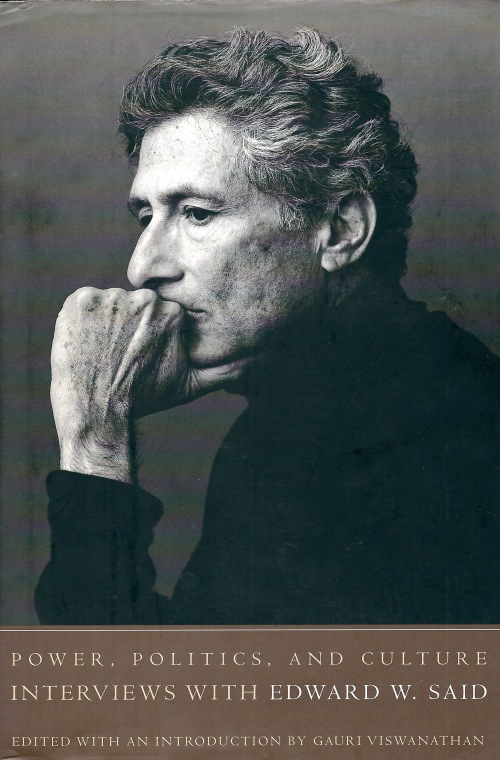Edward W. Said, Power, Politics, and Culture: Interviews
Edited by Gauri Viswanathan
Pantheon Books (2001)
With four friends (from St. Charles, Troy, and Los Angeles), I am reading and discussing the recently published collection of Edward Said’s essays over the course of forty years. Among the most powerful so far are “Zionism from the Standpoint of Its Victims” and an excerpt from his 1986 work with photographer Jean Mohr, After the Last Sky. I’ve also been rereading a volume interviews from the 1970s on, and I have been struck by Said’s strong views on the matter of identity. Following are some of his reflections over the years…
Musically, I am very interested in contrapuntal writing, and contrapuntal forms. The kind of complexity that is available, aesthetically, to the whole range from consonant to dissonant, the tying together of multiple voices in a kind of disciplined whole, is something that I find tremendously appealing. 99
I think the one thing that I find, I guess, the most—I wouldn’t say repellent, but I would say antagonistic—for me is identity. The whole notion of a single identity. And so multiple identity, the polyphony of many voices playing off against each other, without, as I say, the need to reconcile them, just to hold them together, is what my work is all about. More than one culture, more than one awareness, both in its negative and its positive modes. It’s a basic instinct. 99
There’s the whole question of the fractious quality of identity politics. 204
You have all these different ethnic communities who are now beginning to feel that the problem is how to preserve, against the depredations of others, their own identity. Identity politics becomes separatist politics, and people then retreat into their own enclaves. I have this strange, paranoid feeling that somebody enjoys this—usually people at the top, who like to manipulate different communities against each other. It was a classic of imperial rule. 240
I’m a defender of what I would call good work. The main criterion for me in judging a novel or a poem or a play isn’t the identity of the person who wrote it. That’s interesting, but it’s not the major issue. If that person happens to be of the “right” color or gender or nationality, that doesn’t necessarily mean that it’s going to be a very fine work…. And one of the things [Hanan Ashwari] discovered in writing [this dissertation under me] was that being Palestinian and writing about the travail of being under occupation doesn’t necessarily produce good poetry or a good novel. 240-241
What I’m saying is that the fullest and most interesting way to read people like Jane Austen or later Kipling, who writes about India, is to see them not only in terms of English novels but also in terms of these other [Caribbean] novels which have come out. You can read them contrapuntally, to use the metaphor for music. They’re going over the same history but from a different point of view. 244-245
The worst thing ethically and politically is to let separatism simply go on, without understanding the opposite of separatism, which is connectedness. In that respect, I am very conservative. I want to see how everything works. I am not just interested in Palestinian themes in American literature, or Palestinian themes in French literature. What I am interested in is how these things work together. That seems to me to be the great task—to connect them all together—to understand wholes rather than bits of wholes. 261
I think the great problem is the whole issue of national identity, or what I would call the politics of identity—the feeling that everything you do has to be either legitimated by, or has to pass through the filter of, your national identity, which in most cases is complete fiction, as we all know. I mean, an identity that says all Arabs are homogeneously the same and against all Westerners who are all the same. There are many Westerners, there are many Arabs. I think the principal role of the intellectual at this point is to break up these large, national, cultural, transcultural identities. 391
There has to be an understanding, finally, that there is no political or national grouping that is homogenous. Everything we are talking about is mixed, we deal in world of interdependent, mongrelized societies. They are hybrids, they are impure. 392
One of the reasons for this is that I’ve become very, very impatient with the idea and the whole project of identity: the idea, which produced great interest in the United States in the 1960s and which is also present in the return to Islam in the Arab world and elsewhere, that people should really focus on themselves and where they come from, their roots, and find out about their ancestors—as in the book and television program Roots. That strikes me as colossally boring and totally off the mark. I think that’s the last thing that we should be thinking about. What’s much more interesting is to try to reach out beyond identity to something else, whatever that is. It may be death. It may be an altered state of consciousness that puts you in touch with others more than one normally is. It may be just a state of forgetfulness which, at some point, I think is what we all need—to forget. 430-431
